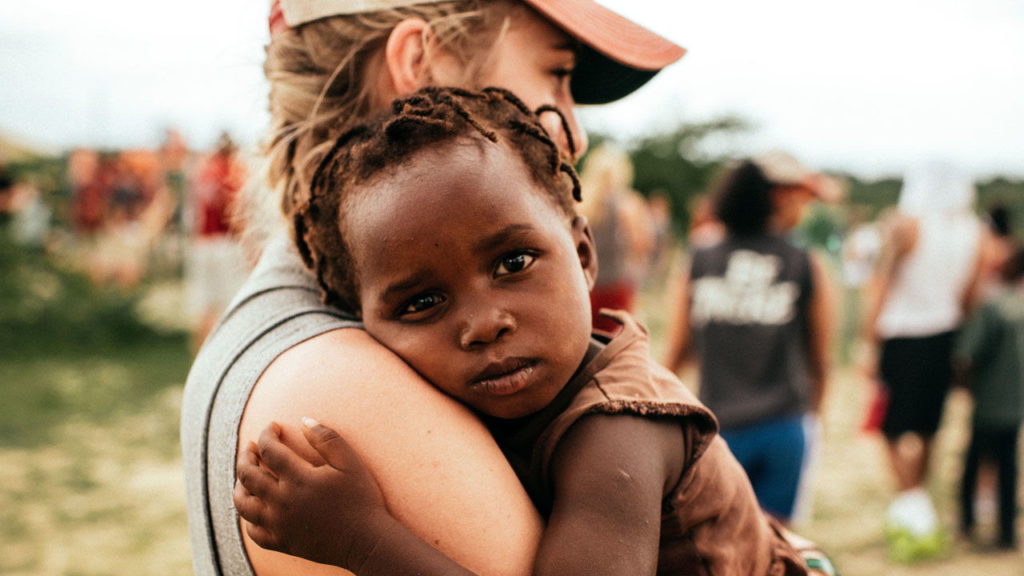Editor’s Note: This article was originally published in 2017.
Did you ever get to be “Mommy’s Little Helper” as a child? I did. Growing up, I loved being in the kitchen with my mom. She’d choose the recipe, the tools, and the methods we’d use, and together we’d put her plan into action.
“Here. We need a quarter of a cup of flour.”
She’d hand me the correct measuring cup, get out the big bag and let me pour it. Focusing, I did my part. The heavy flour bag was a bit awkward for my little hands, and using me as her “helper” often meant more work for my mom in the long run, as the counter would be left speckled with dollops of white after my tenure in the kitchen.
When our signature baked mac and cheese was finally finished, my mom would tell our dinner guests, “Juli helped me make it.” Though I appreciated the affirmation, I always knew the meal would’ve been easier, and possibly better, without my “help.” Practically speaking, I knew that my so-called “help” was actually more of a hindrance, and had she wanted to, my mother would’ve been perfectly equipped to handle the whole meal on her own. My mom was the main actor, the planner, and the corrector, and I was the far less adequate “helper.”
More Than a Helper
So what does God mean when He calls Eve Adam’s helper in Genesis 2?[1]tn Traditionally “helper.” The English word “helper,” because it can connote so many different ideas, does not accurately convey the connotation of the Hebrew word עֵזֶר (ʿezer). … Continue reading Is He providing Eve as the same kind of “helper” I was to my mom in the kitchen? Is Adam the main actor, perfectly competent to complete the task on his own? Is Eve less valuable in cultivating and filling the earth? And if there’s a sense in which all women are represented in Eve, what does that mean for women today? Are we less valuable or less competent than our male counterparts?
Sometimes our cultural baggage can make us feel that way. As women, we may feel small or weak. Society may tell us that we are less valuable, less competent, less intelligent, less seen, and less integral to human flourishing than men. Even with recent progress, women still only make up a third of all speaking roles in major films, are only quoted in 19 percent of news articles, and as I write this, only sing in about a quarter of Billboard’s top 100 songs. Though we make up half of the American population, you wouldn’t know it from our media.
Not only are we forgotten, but we’re frequently oppressed. One in six women reports being a victim of sexual violence, one in four of domestic violence, and two in three of public sexual harassment. Globally, one in three females in the developing world is married off before the age of 18, and 98 percent of sexually exploited trafficking victims are females. In Asia, millions of girls are disproportionately annihilated every year before they’re even given a chance to enter into the world.
If you’re anything like me, you may be tempted to project the oppression we see toward women in culture and society onto God himself. However, thinking that God fundamentally devalues women could not be more wrong. When God calls Eve Adam’s “helper,” he dignifies her with a distinguished and powerful task.
Necessary Ally
What we translate as “a helper fit for him” comes from the Hebrew phrase, ezer kenegdo. Realizing the power of this word, ezer, revolutionizes the way we think about femininity.
Of the 21 times ezer is used in the Old Testament, 16 usages refer to God himself. When God is called the ezer, He protects Israel against her adversaries; He is His people’s shield, strength and triumph; He is called the keeper of life; and He delivers the poor, needy and fatherless. In its lingual context, ezer has been likened to a military term. It is a strong help that implies protection and power, and raises the position of others. Kenegdo is a word that implies not inferiority but partnering correspondence.
Because of the term’s depth, many writers have proposed less culturally-hindered translations of ezer. Wendy Horger Alsup writes that an ezer is one who helps, nourishes, sustains, or strengthens. John McKinley argues that ezer kenegdo is better translated as “necessary ally.”
Though finite Eve is not the perfect ezer that God is, understanding the cultural and lingual context of the word helps us grasp the feminine distinctiveness of Eve’s image-bearing help. In reversing our worldly understanding of strength and power as He so often does, God tasks the physically vulnerable sex with indispensable rescue. The female, the ezer, is tasked with strong, sustaining help that saves the oppressed in times of trouble.
Powerful in Vulnerability
It has often been said that the woman’s God-given biological ability to bear children denotes an innate compassion and nurture unique to her. Understanding firsthand the experience of being overlooked and feeling powerless likewise gives the woman a unique sense of empathy with the vulnerable. Combining compassion, empathy, and strong aid to the marginalized, the woman God created is an indispensable member of His household.
This strongly compassionate female intuition shouldn’t be surprising. Any good social worker knows that the occupation devoted specifically to helping those who cannot help themselves is dominated by females. Historically, within a year of women earning a voice at the voting booth, the passing of the Sheppard-Towner Act decreased the infant mortality rate by nearly 21 percent. In American missionary movements during the past century, women have been the majority of goers to the unreached.
The Bible gives us countless examples of women who lived out their calling as ezer. In fear of God, the Hebrew midwives dared to defy Pharaoh to preserve life, as did his own daughter. Ruth, in her newfound devotion to Yahweh, risked her own safety and livelihood to sustain her elderly mother-in-law. Rahab forsook her own townsmen to protect the people of God, leading to their victory. Abigail interceded to stop David from shedding blood. Deborah walked alongside Barak into battle.
Though she risked dangerous accusations of adultery, Mary faithfully praised God when she found out she would birth the Messiah. When Jesus was crucified, women were the ones standing by the cross throughout the duration of His suffering. Phoebe, a servant commended for her good work for others, faithfully delivered Paul’s letter to the Romans. Women were the first to see and report the good news of Christ’s resurrection to the hurting.
From Inadequate to Indispensable
Woman of God, hear me. Though society and media may have led you to feel objectified and dispensable, you’re not. Your designation as a helper doesn’t point to your inadequacy, but to your indispensability. You’re not an afterthought. You are not a “less than.” You were created with intention in the image of the ultimate Strong Helper. Your primary purpose is not to be anyone’s arm candy. It’s not to be the quarterback’s sideline cheerleader. It’s not to be anyone’s object, trophy, house servant or inferior. You are not expendable. As “it is not good that the man should be alone,” humanity needs you — just as it needs men with their unique gifts, tasks and responsibilities.
Whether you are single or married, you have the ability to fulfill the task that God gave to Eve of being man’s ezer kenegdo. You have a unique nurturing intuition and the ability to empathize with the vulnerable. Where are those in your church, community and family who need necessary allies? How can you sustain, lift up, strengthen and nourish them with the good news of the gospel?
Jesus was our ultimate ezer kenegdo. He chose humility, leaving His high position to become incarnate, dwelling in correspondence alongside humanity. He died to free us from our greatest oppression — our own sin — in order to sustain us with a righteousness that is not our own. In His resurrection, He raised us with Him to new life. Because He is our help, we need not despair. Sisters, let’s resolve today to joyfully live out Eve’s creation designation of ezer kenegdo in the freedom and power of the gospel message.
Copyright 2017 by Juli Cooper. All rights reserved.
References[+]
| ↑1 | tn Traditionally “helper.” The English word “helper,” because it can connote so many different ideas, does not accurately convey the connotation of the Hebrew word עֵזֶר (ʿezer). Usage of the Hebrew term does not suggest a subordinate role, a connotation which English “helper” can have. In the Bible God is frequently described as the “helper,” the one who does for us what we cannot do for ourselves, the one who meets our needs. In this context the word seems to express the idea of an “indispensable companion.” The woman would supply what the man was lacking in the design of creation and logically it would follow that the man would supply what she was lacking, although that is not stated here. See further M. L. Rosenzweig, “A Helper Equal to Him,” Jud 139 (1986): 277-80. https://netbible.org/bible/Genesis+2 |
|---|












